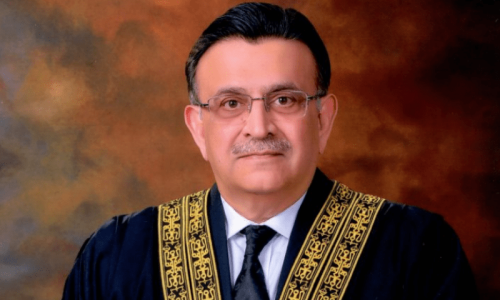ISLAMABAD: Chief Justice of Pakistan (CJP) Umar Ata Bandial on Tuesday regretted that lack of access to justice breeds corruption in society but appreciated the proposed amendments to the National Accountability Ordinance (NAO), designed to address major concerns regarding fate of references taken out of the ambit of the accountability law due to the pecuniary value less than Rs500 million.
The CJP explained he had studied instances from the foreign jurisdiction to understand the behaviour of these countries towards corruption and discovered that the menace had a direct bearing with the right to life.
“Corruption breeds in society because of the failure to access to justice,” emphasised the chief justice, heading a three-judge Supreme Court bench that had taken up a challenge by former prime minister Imran Khan to the August 2022 amendments to accountability law.
At the outset of Tuesday’s hearing, Makhdoom Ali Khan, senior counsel representing the federal government, told the court that the federal cabinet had considered certain amendments and approved a draft ordinance that has been sent to President Dr Arif Alvi for the promulgation of the same.
The counsel also cited March 11, 2023 letter of Prime Minister Shahbaz Sharif to the president rendering an advice for promulgating the amendment in which a number of changes have been proposed like all pending inquiries or cases below the threshold of Rs500 million will now be transferred to the relevant forums by accountability court than NAB chairman. The accountability courts will also approve or disapprove closing of any inquiry or investigation into corruption allegations.
Draft of changes to accountability law sent to Alvi, SC told
Presently the proposed legislation is pending before the president, the counsel argued, adding that there were also another set of amendments under active consideration of the government which may be presented before the parliament for enactment or may also be promulgated through ordinances but the period when it will be done cannot be suggested now.
The CJP observed that it was a good thing that after the amendments, people accused of corruption would not be condoned or exonerated, rather would be handled effectively, something which was missing earlier in the law.
It is not secret, the counsel regretted, that ever since 1996 when the first Ehtesab Ordinance came and later become an act in 1997 until today, the accountability court was deployed as a tool of political victimization also recalling how in the 2001 Asfandyar Wali case, the Supreme Court had held that NAB should have a grievance redressal mechanism as well as it should develop certain rules but both directions have not yet been adhered to.
The apex court in the Asfandyar Wali case had held that it did not strike down the NAO but it did not mean the parliament had been stopped from amending the accountability law.
The counsel argued that the first major amendment to the accountability law came during the term of prime minister Imran Khan, who is the petitioner in the present case, alleging that his first amendment in the law was to settle scores against political opponents like an individual (Nawaz Sharif) who was given Class C in jail.
The amendments brought in by the petitioner himself were aimed at bringing substantive changes in the law to address the issues identified by the Supreme Court in different cases, but the petitioner challenged the same before the court within five days after the amendments made by the incumbent coalition government.
When the CJP observed that this was how the government in waiting should be prepared to act, the counsel retorted that the first duty of the political entity was to debate issues in the parliament but the petitioner by abdicating his duty and instead of going to the parliament, took all political controversies to get it addressed by the courts.
The counsel argued that the present government had improved the corruption law by tightening belt around the menace and making corruption more difficult, also recalling that after the 2017 Hanif Abbasi case, the amnesty schemes were also taken out of NAB’s purview and considered to be issues that deals with the taxation matters since already adequate remedy was available.
Referring to the 2020 Khawaja Salman Rafiq case, the counsel emphasised that the apex court had asked NAB to stay away from transactions between private individuals and private entities. When the CJP reminded him that those observations came on a bail matter, the counsel argued that all observation by courts against the conduct of NAB had come in bail matters.
Published in Dawn, March 15th, 2023














































Dear visitor, the comments section is undergoing an overhaul and will return soon.